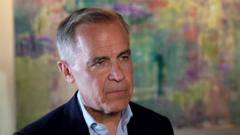In a recent BBC interview, Canada’s Prime Minister Mark Carney emphasized that trade and security discussions with the United States will proceed on Canada's conditions, reflecting his commitment to national sovereignty.
Canada to Navigate US Relations with Firm Stance, Says PM Carney

Canada to Navigate US Relations with Firm Stance, Says PM Carney
New Canadian Prime Minister asserts respect and terms in negotiations with the US.
Canada's newly-elected Prime Minister Mark Carney has made it clear that when it comes to negotiating with the United States, the terms will be set by Canada. In an exclusive interview with the BBC, shortly before polls closed in the recent snap election, Carney underlined Canada’s desire for respect from its southern neighbor, especially in light of President Donald Trump’s recent comments suggesting that Canada could become the "51st state." Carney firmly stated, "this is never going to happen," signaling a strong intent to preserve Canadian sovereignty.
With approximately 75% of Canadian exports directed towards the U.S. and significant trade relations tied to energy, Carney is keen to ensure that Canada is recognized as a vital economic partner. He pointed to the potential for a mutually beneficial partnership that respects Canadian interests, highlighting a "win-win" scenario should effective agreements be negotiated, especially amidst Canada’s ongoing focus on strengthening trade ties with the European Union and the United Kingdom.
Relations between Canada and the U.S. have grown tense, exacerbated by Trump's derogatory remarks regarding former Prime Minister Justin Trudeau and recent tariffs imposed on Canadian goods. Carney's administration will approach trade talks with a resolution from the Canadian perspective, insisting they will engage "on our terms, not on their terms."
The new Prime Minister, who has a history of navigating economic turmoil, including the 2008 global financial crisis, aims to leverage his experience in dealing with tariffs and trade disputes. Carney noted that Canada plays a crucial role in supplying energy needs and agricultural resources to many states in the U.S. This dynamic, said Carney, warrants a fair level of respect in negotiations.
Amidst a backdrop of escalating trade tensions globally, Carney sees opportunities for deeper ties among like-minded nations, discussing prospects for free trade agreements with the UK and leveraging existing relationships to counterbalance U.S. tariffs. Prime Minister Keir Starmer of the UK extended congratulations, expressing a desire for continued collaboration on various fronts, including security and trade.
As Canada prepares to host a pivotal G7 summit in June, Carney views this as a crucial moment for shaping the future of global trade, especially concerning the ongoing tariff disputes with the U.S. The upcoming discussions will test if the G7 remains aligned on key economic challenges that face its members.
With approximately 75% of Canadian exports directed towards the U.S. and significant trade relations tied to energy, Carney is keen to ensure that Canada is recognized as a vital economic partner. He pointed to the potential for a mutually beneficial partnership that respects Canadian interests, highlighting a "win-win" scenario should effective agreements be negotiated, especially amidst Canada’s ongoing focus on strengthening trade ties with the European Union and the United Kingdom.
Relations between Canada and the U.S. have grown tense, exacerbated by Trump's derogatory remarks regarding former Prime Minister Justin Trudeau and recent tariffs imposed on Canadian goods. Carney's administration will approach trade talks with a resolution from the Canadian perspective, insisting they will engage "on our terms, not on their terms."
The new Prime Minister, who has a history of navigating economic turmoil, including the 2008 global financial crisis, aims to leverage his experience in dealing with tariffs and trade disputes. Carney noted that Canada plays a crucial role in supplying energy needs and agricultural resources to many states in the U.S. This dynamic, said Carney, warrants a fair level of respect in negotiations.
Amidst a backdrop of escalating trade tensions globally, Carney sees opportunities for deeper ties among like-minded nations, discussing prospects for free trade agreements with the UK and leveraging existing relationships to counterbalance U.S. tariffs. Prime Minister Keir Starmer of the UK extended congratulations, expressing a desire for continued collaboration on various fronts, including security and trade.
As Canada prepares to host a pivotal G7 summit in June, Carney views this as a crucial moment for shaping the future of global trade, especially concerning the ongoing tariff disputes with the U.S. The upcoming discussions will test if the G7 remains aligned on key economic challenges that face its members.





















